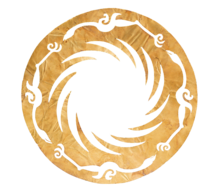Ba–Shu culture
Ba–Shu culture (Chinese: 巴蜀文化; pinyin: Bāshǔ wénhuà; Wade–Giles: Pa-Shu wên-hua), bɛ ni lahi tooi chirigiri m booni shɛli Chongqing–Sichuan culture, wuhiri la Sichuan tiŋgbani yaɣa mini Chongqing tiŋgbani ni kaya ni taɣada, China mini di tiŋgbani yaɣa, n-ti pahi Yunnan tiŋgbani yaɣa din baɣ'li mini Guizhou, di ni niŋ ka Han Chinese pubu shɛŋa din be lala yaɣa dibaa ayi ŋɔ gba nyɛ pa tɔɣisiri Southwestern Mandarin noli ni yɛltɔɣa dabisa ŋɔ ni la. Di mali taarihi waɣinli n gari yuun tusaata.[1][2][3]

Sabiri kura
mali niŋBɛ ya yɛltɔɣa
mali niŋMɛbu
mali niŋSichuanese mɛbu
mali niŋSichuanese garden
mali niŋVisual arts
mali niŋPerforming arts
mali niŋSitura
mali niŋBindirigu
mali niŋDin pahi
mali niŋ- Religious sites in Sichuan
-
Golden Temple of Mount Emei of the Chinese Buddhist tradition.
-
Statues of buddhas at a Litang monastery of the Tibetan Buddhist tradition.
-
St. Joseph's Cathedral, Chongqing (Roman Catholic).
Lihimi mpahi
mali niŋExternal links
mali niŋ- The Center for Bashu Cultural Studies of Sichuan Normal University (English website) Archived Silimin gɔli May 14, 2023, at the Wayback Machine
Kundivihira
mali niŋ- ↑ Error on call to Şablon:cite web: Parameters url and title must be specified (June 2006).
- ↑ Error on call to Şablon:cite web: Parameters url and title must be specified.
- ↑ Error on call to Şablon:cite web: Parameters url and title must be specified. Center for Bashu Cultural Studies, Sichuan Normal University.